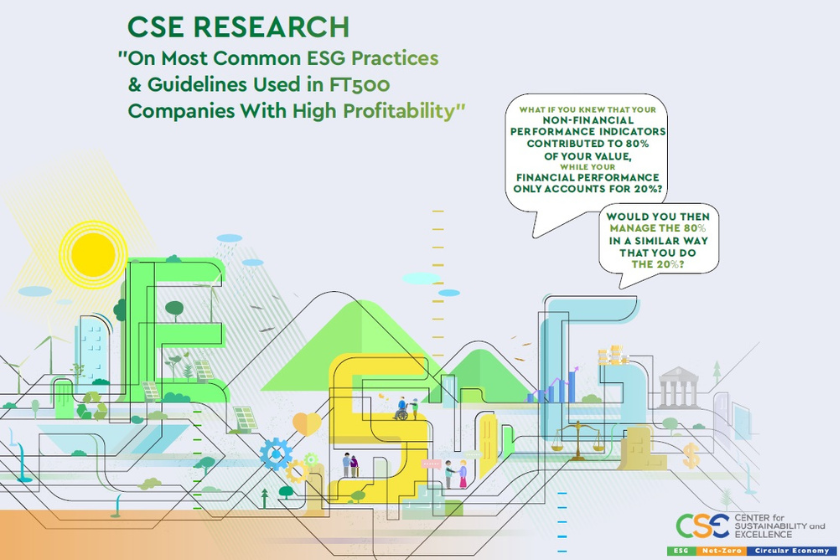CSE Research explores why ‘doing business as usual’ is no longer a valid option and the shift to ‘doing business in a sustainable way’ is the only way that will secure companies’ trust and access to financing.
For the 6th consecutive year, the Center for Sustainability and Excellence is proud to announce the unique findings from its Research in ESG Ratings and Reporting Trends, focusing on ESG best practices and standards used in 2022 and how they affect profitability and transparency. CSE’s research examined the ESG practices and commitments of more than 400 FT 500 companies in North America and Europe from 31 sectors, with high percentage of profitability within the last years. CSE’s unique research identified the Top 25 ESG Performing Companies and Top 10 per Sector and explored common success practices, including the most widely used ESG Standards and goals setting.
The research’s findings verified that there is indeed an increased influence between financial performance, brand credibility and ESG good practices. More specifically, the 25 companies such as General Mills, Ford, NIKE, Target, AIG with the highest percentage increase in profits between 2020 and 2021, are characterized by the following :
Common Success Practices by the leaders
High in average consolidated ratings on the four ESG ratings (MSCI, CDP, Sustainalytics, and S&P Global), use of ESG-related standards (GRI, SASB, TCFD) and incorporation of stakeholder concerns and preferences into their strategies, comprehensive independent ESG reporting, as well as commitment to ambitious quantitative goals.
Leading and Lagging Sectors
The research also showed interesting conclusions with regards to the ESG incorporation potential of each sector. The sectors of “Beverage & Food Consumer Products”, “Real Estate”, and “Insurance: Life & Health (Mutual, Stock)” are clearly leading the way. The lagging sectors are: Diversified Financials, Food Production, Insurance (Property & Casual), Metals, and Petroleum Refining/Energy.
Climate Commitments and lack of Transparency
Regarding their climate commitments, the findings of the research demonstrate that although the companies set ambitious goals, there is still lack of transparency. For example, 29% of the companies have validated near-term reduction targets and almost 50% have set net-zero targets. It remains to be seen if these goals are true, or wishful thinking, or unintentional greenwashing.
The rise of ESG Standards. Independent Sustainability Reporting is Becoming more Important Than Ever
Regarding the reporting methods and verification of the disclosed data, out of the 310 companies evaluated, 86% have published an accessible, independent Sustainability (ESG) report, but only 30% have an External Assurance. This means that while there is transparency of data, there is no third-party verification and or any trend for Integrated Reporting.
Another interesting finding has to do with their preferred ESG Standards. 44% have included reference and commitments to the UN Sustainable Development Goals, 74% have complied with the SASB Standards, and 64% reference the recommendations of the TCFD. The use of specific global standards and frameworks verifies that top companies adopt a more strategic approach towards ESG, aiming to secure better consolidation of scores, easier comparability and greater transparency.
UPCOMING TRAININGS FOR USA & CANADA
USA | Certified Sustainability (ESG) Practitioner Program, Advanced Edition 2023, DIGITAL VERSION | March. 9-10 & 13, 2023
Canada | Certified Sustainability (ESG) Practitioner Program, Leadership Edition 2023, DIGITAL VERSION | Apr. 20-21 & 24, 2023
NYC LIVE | Certified Sustainability (ESG) Practitioner Program, Leadership Edition 2023 | June. 15-16, 2023








